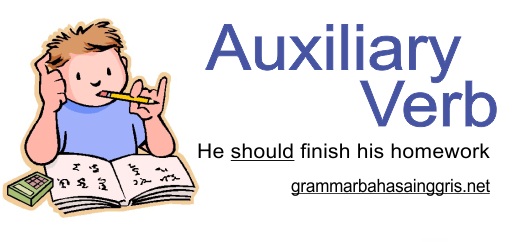Apa itu auxiliary verb? Pengertian auxiliary verb adalah kata kerja yang muncul sebelum kata kerja utama (main verb) atau bisa disebut juga kata kerja bantu dari kata kerja utama. Kata kerja ini tidak bisa berdiri sendiri, namun dapat mengubah/memodifikasi makna dari kata kerja utama.

Jenis-Jenis Auxiliary Verb
Auxiliary verb mempunyai auxiliary verb list:
Primary Auxiliary Verbs
Primary auxiliary verbs terdiri dari: be (am, is, are, was, were), do/does (did dalam past tense), dan have / has (had dalam past tense). Contoh-contoh kalimatnya seperti ini:
- I am a teacher. (Saya seorang guru.)
- He is a student. (Dia seorang murid.)
- She was a film star. (Dulu dia seorang bintang film.)
- We were younger. (Dulu kita lebih muda.)
- He doesn’t work here anymore. (Dia sudah tidak bekerja di sini lagi.)
- I didn’t tell anyone about you. (Saya tidak memberitahu siapa-siapa tentang kamu.)
Modal Auxiliary Verbs
Modal auxiliary verbs terdiri dari: can, could, may, might, will, would, shall, should, must, dan ought to. Contoh-contoh kalimatnya seperti ini:
- It can’t be him! (Tak mungkin itu dia!)
- I could do that if I wanted to. (Saya bisa melakukannya kalau saya mau.)
- He may know what to do. (Mungkind dia tahu apa yang harus dilakukan.)
- She will grow up to be a fine young woman. (Dia akan tumbuh menjadi wanita muda yang baik.)
- Would you like some coffee? (Anda mau minum kopi?)
- Shall I tell you what happened? (Bolehkah saya bercerita kepada Anda mengenai apa yang telah terjadi?)
Ada juga contoh-contoh gabungan / mixed auxiliary verb, seperti:
- I have been here for two hours! (Saya sudah di sini selama dua jam!)
- You shouldn’t have said that to her! (Seharusnya kamu tidak berbicara begitu padanya!)
- I would’ve noticed that. (Saya mungkin akan lebih memperhatikan itu.)
Contoh Soal Auxiliary Verb
Lalu, bagaimana dengan contoh auxiliary verb?
- The police officer warned the crowd that he ……………… order shooting, if they created trouble.
a could
b would
c might - Passengers ……………… not smoke inside the bus.
a will
b should
c must - ………………. I have a word with you?
a will
b may
c can
Either ‘can’ or ‘may’ - Parents ……………….. not accompany their children to the school.
a must
b can
c would - There was a time when I ……………… stay up late, but these days I go to bed early.
a used to
b ought to
c should - The Principal said that candidates without hall tickets ………………. not be permitted inside the examination hall.
a could
b would
c should - You ………………….. tell me. I know everything.
a must not
b need not
c cannot - Even if he had come a little earlier , he ………………… have got a seat in the front row.
a should not
b might not
c would not
Jawaban:
- The police officer warned the crowd that he would order shooting, if they created trouble.
(Kalimat ini dalam bentuk past tense dan polisi telah memperingatkan, maka jawaban yang pasti adalah would.) - Passengers must not smoke inside the bus.
(Mengingat konteksnya adalah tentang aturan, maka jawaban yang sesuai adalah must.) - Can / may I have a word with you?
(Keduanya cocok, mengingat konteksnya adalah meminta tolong atau requesting a help.) - Parents must not accompany their children to the school.
(Mengingat konteksnya adalah tentang aturan, maka jawaban yang sesuai adalah must.) - There was a time when I used to stay up late, but these days I go to bed early.
(Mengingat konteksnya adalah mengenai kebiasaan lama / past habit yang sudah tidak dilakukan lagi, maka used to adalah jawaban paling pas.) - The Principal said that candidates without hall tickets would not be permitted inside the examination hall. (Kalimat ini dalam bentuk past tense dan kepala sekolah telah berbicara, maka jawaban yang pasti adalah would.)
- You need not tell me. I know everything.
(Kalimat kedua mengindikasikan bahwa lawan bicara telah tahu segalanya, maka jawaban yang sesuai adalah need not.) - Even if he had come a little earlier, he would not have got a seat in the front row.
(Kalimat ini mengindikasikan third conditional, maka would not merupakan jawaban yang cocok. Should not biasa dipakai untuk menasihati atau menyalahkan seseorang, maka tidak cocok untuk konteks kalimat ini. Might not berfungsi sebagai deduksi.)
Sekian tentang auxiliary verb. Semoga bermanfaat dan selamat belajar.
References:
- Wishon, George E and Julia M. Burks. 1980. Let’s Write English Revised Edition. Litton Educational Publishing, Inc: New York.
- Susilo, Teguh Handoko, 2014. “Rahasia Memahami & Menguasai Struktur Bahasa Inggris Dalam 30 Hari”. e-Compusoft Jakarta.
- Azar, Betty Schrampfer. 1999, Understanding and using English Grammar, Third Edition, United State of America: Pearson Education.
